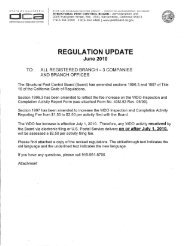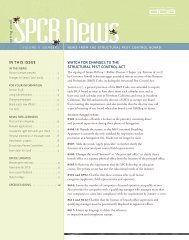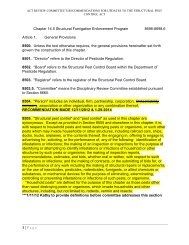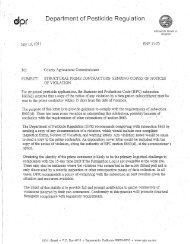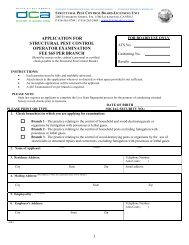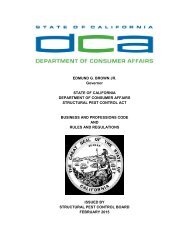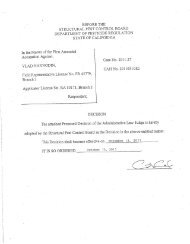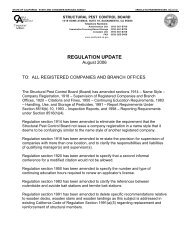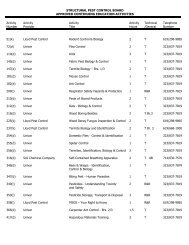Minutes - Structural Pest Control Board
Minutes - Structural Pest Control Board
Minutes - Structural Pest Control Board
You also want an ePaper? Increase the reach of your titles
YUMPU automatically turns print PDFs into web optimized ePapers that Google loves.
Committee member Dennis Robertson states the following in summary:<br />
We don't have a problem with detection. It is a function ofa Branch 3 since it is<br />
for termites. An inspection should be done within three years because people may<br />
get a false sense ifthere is no·problem. We do monitoring as a warranty program<br />
and it is fee based. I know that it is an added expense. The consumer is getting .<br />
more for their money and they understand that. We can justify the costs.<br />
Mr. Rowell believes that an inspection is required before the items can actual be installed.<br />
He continued that a three-year inspection should pose no issue.<br />
Mr. Good conceptualizes that if a Bnmch 3 performs an inspection and assuming noting<br />
is found, the customer can be given the option to elect for a CSA or detection program.<br />
Mr. Rowell continues about the number of devices installed maintaining that Orkin, Indc.<br />
Usually installs between six to eight devices while Terminix {as explained by Mr.<br />
Ennes} installs approximately eight devices.<br />
Mr. Ennes comments that he does not agree with the three-year inspection requirement<br />
because it can be cost prohibitive. However, he agrees that an initial inspection should<br />
take place prior to the installation of the devices.<br />
Mr. Good asked the significance of a full or limited inspection.<br />
Mr. Rowell comments that the inspection is consumer driven:-<br />
Mr. Robertson states that the <strong>Structural</strong> <strong>Pest</strong> <strong>Control</strong> Act allows either a full inspection or<br />
a limited inspection.<br />
Mr. Rowell states that three-year inspections add expense, but he believes this is a small<br />
compromise: He adds that some times the devices can fail and to replace them can add<br />
costs as well.<br />
Mr. Good states that customer perceptions about a CSA verses a detection agreement ·can<br />
be confusing. Additionally, companies may have an incorrect perception because current<br />
laws and regulations require a baiting or monitoring system and not a detection system.<br />
Mr. Rowell comments that a CSA requires that the customer pay for specific services at<br />
the beginning while a detection program is free of charge.<br />
The audience comments that consumer cannot be expected to understanCl the differences<br />
between the two programs especially since a CSA warrants against damage while a<br />
detection program is dedicated only to infestation.<br />
Bill Gaither questions how the program is to be administered if a customer cancels<br />
service or if the property is sold.




